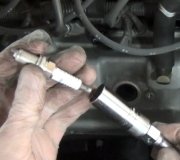The term "tune-up" is kind of a thing of the past. Adjustments don't exist and most items that develop wear are gone. The mileage isn't necessarily the determining factor in what is done but it can be considered a milestone by which judgements are made as to what to replace.
Spark plugs and wires are typically replaced before a running problem develops. Most newer engines don't even use spark plug wires any more. Air and fuel filters should be replaced unless they were replaced recently. The exception is you don't need to replace fuel filters on Chrysler products. They last the life of the car unless they get so old they rust out and leak.
Differential gear lube is not replaced as a maintenance item. Engine coolant should be replaced every two years. It's alcohol and will always be alcohol but over time natural seepage of combustion gases into the coolant forms acids that eat at metal parts. The water pump lubricant and corrosion inhibitor additives wear out in about two years. Even the "long life" coolants should be changed every two years. General Motors advertised theirs as "lifetime" coolant to make the cost of maintenance look lower than their competitors, then in the owner's manual they changed the story and recommended changing it every three years. Even the Dex-Cool company recommends two-year intervals like normal. That stuff turns into mud and GM has a huge problem with corroded heater cores and radiators because of acid buildup in their cooling systems.
Besides engine-related stuff you might consider an alignment, or at least a steering and suspension system inspection, especially if you hear any clunking or rattling noises. Ford products should be inspected a minimum of once a year because they are well-known for parts that separate leading to loss of control and crashes. That's not a common problem on BMWs but a periodic inspection is still a good idea. Your mechanic will also "read" the tire wear patterns for signs of a developing problem.
SPONSORED LINKS
Monday, May 13th, 2013 AT 10:38 AM





